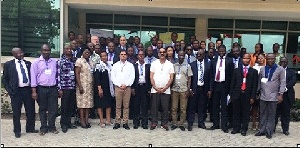Stakeholders in the fertilizer value chain have held a two-day workshop to validate four financing models in order to provide better and more sustainable financing for fertilizer value chain actors including importers, blenders, agro-dealers and to farmers, especially smallholders. There were participants from Nigeria, Burkina Faso, Togo, Cote d'Ivoire, Niger, Senegal, and Ghana.
With presentations and several focus group discussions to debate on the pros and cons of the models presented, the workshop looked at ways to promote access to financing on a platform that is accessible to all stakeholders in the West Africa fertilizer value chain, and to vet the adapted financial models.
The workshop, sponsored by the USAID West Africa Fertilizer Programme (WAFP) and in collaboration with ECOWAS was held under the theme: ‘Vetting of Existing Financial Models Suitable for the Fertilizer Value Chain in ECOWAS’.
Cecilia Khupe, Chief Compliance Officer of the African Fertilizer and Agribusiness Partnership (AFAP), noted that these financial models have been successful in other African and Asian countries and are being discussed to select and fine-tune them to suit the West African terrain.
“We are here today to validate financing mechanisms that are working elsewhere in Africa and internationally that can be adapted in West Africa especially around the fertilizer value chain,” she said.
Noting that commercial banks shy away from lending to agriculture, the fertilizer players are looking at ways of mitigating the problems of agriculture and making sure that agriculture has access to finance.
“We have looked at models where financial institutions through some kind of guarantee facilities have agreed to basically benchmark lending at lower rates to agriculture. Financial lending is not only about the financial institutions but also the government bodies within the country come into play.
There is a lot more we can do and all these models will be looked at. Also what works in another country doesn’t necessarily mean it can work in another one but the best practices can be adjusted to suit the new country,” she added.
Many African governments have provided subsidies to farmers to acquire farm inputs including fertilizers but analysts and agronomists have expressed their disapproval of this method of supporting farmers, noting that this method is not sustainable.
“We have to continue thinking about the farmer. It does not help us for the fertilizer distributor, importer and manufacturer to borrow at a very high price because it is the farmer who will buy the ultimate bag of fertilizer who will be paying those high rates.
It has to be a win-win situation. If the financial institution is willing to adopt a certain model and the borrower also agrees to that model, which makes it cheaper to borrow then the farmer benefits and everyone in society benefits,” Ms. Khupe added.
Robin Wheeler, Chief of Party at the USAID West Africa Fertilizer Program (WAFP), added that the project is seeking to improve agricultural productivity in the sub-region through increasing the supply and use of appropriate and affordable fertilizer.
“Financing for value chains is a major constraint to private sector development and leadership in the fertilizer sector, and your agreement on adapted model(s) that could be appropriate for this purpose is the first step in the process to resolving this issue.”
He added that to facilitate private sector development and investment in the fertilizer sector in the sub-region, agreement/consensus on workable financing models that can be used by different actors is crucial.
“We certainly do understand and are not expecting you to work out all the details of complete financing schemes in the next 1½ days, but if you can achieve general consensus about which models may be workable, this will provide a critical starting point from which details can be ironed out and such schemes can emerge,” he added.













